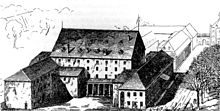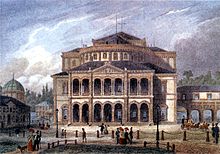Badisches Staatstheater Karlsruhe
The Badisches Staatstheater Karlsruhe is a multi-branch theater in Karlsruhe . It includes opera, ballet, concert, drama as well as the young state theater and popular theater divisions founded in 2011. The Badische Staatskapelle Karlsruhe and the Badische Staatsopernchor are connected to the theater . The house is the main venue for the annual Handel Festival in Karlsruhe . Every two years, the State Theater is one of the organizers for the European Culture Days and the Premières Festival .
Peter Spuhler has been general director since 2011 , and Anna Bergmann has been acting director from the 2018/2019 season . As one of two state theaters, the Baden State Theater is sponsored by the State of Baden-Württemberg . The city of Karlsruhe bears half of the subsidy requirement.
Venues
The Karlsruhe State Theater has been located in a building complex at Ettlinger Tor since 1975 . The Big House has 1002 seats, the Small House 330 to 385 seats (some with variable seating). In addition, a 128-seat studio was set up in the former rehearsal stage in 2011 , which shows contemporary drama. The State Theater Karlsruhe also includes the outdoor theater Die Insel in Karlstrasse, which has been played mainly by the newly founded Young State Theater for children and young people since September 2011 and offers space for 126 spectators.
history
The first forerunner of the Karlsruhe State Theater was built by the Baden building director Friedrich Weinbrenner on Schlossplatz by 1808 . In 1810 it became the Grand Ducal Court Theater.


On February 28, 1847, a fire broke out during a performance, during which the building, which was mainly made of canvas and wood, was completely destroyed. Despite the very fast arrival of the Durlacher Pompiers under Christian Hengst in just 28 minutes, 63 visitors were killed because the doors opened inwards and panic broke out. This led to changes in building regulations for public buildings worldwide. The successor building, built by court architect Heinrich Hübsch , was completed in 1853 and opened under the direction of the theater director Eduard Devrient .
During an air raid on September 27, 1944, the court theater burned down again. The ruin remained until the 1960s. In 1960 an architectural competition for a new building on the same site was decided, but then the city made the area available to the Federal Constitutional Court for its new building in order to prevent its relocation from Karlsruhe. After the ruins of the court theater were torn down, planning began in 1964 for the theater building, which still exists today, at the transition from the southern part of the city to the city center, which was built from 1970 to 1975 according to plans by the architect Helmut Bätzner . The Karlsruhe Concert Hall (Large House) and part of the Stadthalle (Small House) served as provisional venues until completion .
Since 1977, through the initiative of General Manager Günter Könemann, the works of the baroque composer Georg Friedrich Handel have been presented in a special setting. Handel days were held from 1978 to 1984, and in 1985 these were elevated to the rank of Handel Festival . They have taken place annually since then, in February around the composer's birthday on February 23.
General manager was Pavel Fieber from 1997 to 2002 , and Achim Thorwald from 2002 to 2011 . His successor since September 2011 is Peter Spuhler. Birgit Keil has been the ballet director since 2003 , Justin Brown has been the general music director since 2008 , Nicole Braunger is the opera director and Anna Bergmann is the acting director .
In the 2011/12 season, Artistic Director Peter Spuhler founded two new branches, the Junge Staatstheater, under the direction of Ulrike Stöck , and the Volkstheater, directed by Beata Anna Schmutz .
On January 21, 2014, the Karlsruhe municipal council decided on a general renovation and expansion of the state theater at a cost of 125 million euros (as of 2014). Initially the plan is to build a new playhouse with an integrated Young State Theater. Then new musical rehearsal rooms and workshops are created. As the last step, the existing building is to be renovated. In December 2014, a jury unanimously selected three works as winners for the renovation. Since July 2015, Delugan Meissl , Vienna, with Wenzel + Wenzel, Karlsruhe, have been appointed as architects for the New State Theater .
The Badisches Staatstheater was invited to the Berlin Theatertreffen for the first time in 2016 with Hans-Werner Kroesinger's documentary piece Stolpersteine Staatstheater , which deals with the treatment of Jewish theater employees during the Nazi era .
In memory of the conductor Hermann Levi , the forecourt of the State Theater was officially named Hermann-Levi-Platz in February 2017.
literature
- Günther Haass, Wilhelm Kappler, Bernhard Müller, Marie Salaba, Hansmartin Schwarzmaier : Karlsruhe Theater History: From Court Theater to State Theater. Braun, Karlsruhe 1982, ISBN 3-7650-0452-9 .
Web links
- Badisches Staatstheater Karlsruhe
- Society of Friends of the Baden State Theater
- Badisches Staatstheater in the Stadtlexikon of the Stadtarchiv Karlsruhe
- Badisches Staatstheater Karlsruhe in the Stadtwiki Karlsruhe
- Hoftheater Karlsruhe in the Stadtwiki Karlsruhe
Individual evidence
- ↑ Christine Dössel: Radically feminine. In: sueddeutsche.de . April 20, 2018. Retrieved May 6, 2018 .
- ↑ Baden-Württemberg Ministry of Science, Research and Art: State Theater ( Memento from July 12, 2012 in the web archive archive.today )
- ^ City of Karlsruhe: Stadtchronik Karlsruhe 1960–1969 , accessed on March 13, 2013.
- ↑ A new State Theater Karlsruhe on staatstheater.karlsruhe.de , accessed December 16, 2014.
- ↑ http://spielzeit14-15.staatstheater.karlsruhe.de/aktuell/news_id/373/
- ↑ The cruelest dramas take place behind the scenes. In: Der Tagesspiegel from May 17, 2016.
Coordinates: 49 ° 0 ′ 14.5 " N , 8 ° 24 ′ 21.9" E

